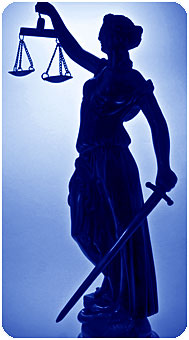The newly appointed Senior Counsel announced their appointment to the Full Court of the Federal Court at the Commonwealth Law Courts on 17 December 2009. The remarks made by the Honourable Justice Greenwood at the ceremony are reproduced below.
 The tradition in England has been that on the appointment of silk, the appointee processes in turn to each of the courts that are sitting, announces his or her appointment and makes their bow.
The tradition in England has been that on the appointment of silk, the appointee processes in turn to each of the courts that are sitting, announces his or her appointment and makes their bow.
Since the year 2000 the practice in Queensland has been that in addition to Senior Counsel announcing their appointment before the Supreme Court, Senior Counsel have announced their appointment before a Full Bench of the Federal Court of Australia, convened for that purpose.
This practice has much to commend it not only because of the important distribution of powers contained in our Constitution but also because this Court exercises the judicial power of the Commonwealth of Australia, our national polity, and the thing that ultimately makes us, first and foremost, Australians.
Announcements are also made to Full Courts of the Federal Court in Sydney and in Melbourne by Senior Counsel appointed in those States.
On behalf of the Federal Court of Australia, I congratulate each of you upon your appointment and wish you well in your future practice at the Inner Bar, or, put historically, “within the Bar”. In doing so, I speak particularly on behalf of the Judges who are present in Court this morning, and on behalf of Justice Spender who is presiding at a native title determination application outside Brisbane and Justice Dowsett who cannot be present today. I also extend the congratulations of Chief Justice Black and the entire cohort of Judges of this Court nationally.
Mr Rice, you are well known for your role within the office of the Commonwealth Director of Public Prosecutions and your extensive experience in the prosecution of federal offences. Today, we are sitting in Court 3 due to the renovations to Court 1 to incorporate state of the art jury facilities in light of the enactment of the Federal Court of Australia (Criminal Jurisdiction) Act 2009 which commenced on 4 December 2009 conferring jurisdiction to hear and determine the prosecution of indictable offences against particular provisions of the Trade Practices Act 1974.1
Mr Rice, perhaps we may see more of you.
Mr Byrne, you are well known for the role you have discharged as Assistant Director of Public Prosecutions and as a Crown Prosecutor. In that role, you have shown significant leadership in the supervision, management, training and motivation of a multidisciplinary team of up to 88 staff members drawn from professional and administrative backgrounds.
Mr Horneman-Wren, you are well known to this Court in federal jurisdiction work and particularly in relation to your work in the Industrial Division of the Court.
We congratulate each of you on your appointment.
I mentioned earlier the historical reference to practice as Silk “within the Bar”. Although the historical origin of the institution of Silk is not an analysis for this morning, there are two early aspects of the institution that have enduring importance at the centre of modern Australian society for these reasons.
As Sir Victor Windeyer and Mr Bernard Kelly have observed2, the term “barrister” may have derived from a reference to the barrae or benches on which the members of the Inns sat during moots3. The term “barrister” became associated with the bar of the courts to which Counsel came to plead the causes of their clients. The call to the bar may have originally meant the admission of qualified students to a position in the hall of the Inns immediately below the benches4.
In any event, in early court rooms, part of the floor was railed off by a bar. Within the bar, members of the Court sat upon their bench. Outside the bar, members of the public gathered. All persons having business before the court approached the bar and they and their advocates stood at the bar rail and were heard from there.
Sergeants and Kings and Queens Counsel however were heard from within the bar and had a right to be heard inside the bar in recognition of their standing, learning and position as leaders of informed thought in the law. Other barristers stood outside or beyond the bar.
There is however something much more fundamental to our democracy about the notion of the bar at court. The great constitutional struggle in England against the Stuarts was not, as some commentators think, about the separation of powers, but rather the supremacy of Parliament, in all things: fought for by Cromwell and finally established by the Bill of Rights5 and the Act of Settlement6 arising out of the revolution of 1688. The bar of the Parliament is the symbol of that supremacy and independence. Some may plead a case to Parliament by standing at the bar of Parliament. The bar of the Court, now represented by tables, represents the independence of the courts, which in their most fundamental role, stand between the citizen and the executive.
As the Hon. Murray Gleeson has observed, the provisions of the Act of Settlement guaranteeing the independence of the Judges from the executive and removal only by an address by both Houses were adopted by the Act of Settlement Parliament to secure the independence of the Parliament itself by removing the threat to the independence of the Judges arising out of appointments made simply “during the King’s pleasure”.
Interestingly enough, one final legacy of these constitutional events was the passage of an Act for the union of England and Scotland7. Article IV provides that from and after the union subjects shall have full “freedom and intercourse of trade and navigation to and from any port or place” within the United Kingdom. That article is the source of s 92 of the Australian Constitution.
Does any of this matter today?
Your appointments as Senior Counsel are a central part of the vitality of the Rule of Law characterised by representative and responsible democracy, a written Constitution incorporating a distribution of power and a separation of powers, a free press, an independent judiciary and a profession of advocates led by senior men and women, Senior Counsel, who understand the vital role the Bar plays in the preservation of the Rule of Law and who lead the profession with courage, integrity, intellectual honesty, application and humility, bounded by a recognition that the privileges conferred by your appointment impose even greater responsibilities of leadership than those you have experienced to now.
 The second matter is this.
The second matter is this.
The institution of Senior Counsel has in recent years been under significant attack. However, society values learning, wisdom, insight and the importance of education and looks to leaders in many walks of life. For a long time, the monasteries were centres of learning and in more modern times the universities have assumed that role. Leaders of the Academy profess expertise in many disciplines and some become emeritus professors. In the humanities, which most closely have a sympathy of interest with the legal discipline, the Academy of the Humanities and the Academy of the Social Sciences appoint Fellows. So too does the Academy of Sciences. Aboriginal communities look to their elders for learning, leadership and decisionmaking and the wider community looks to its elders, most recently demonstrated in Andrew Denton’s series of interviews under the title Elders, for leadership, learning and inspiration.
It is right and proper that the profession of advocates should identify the leaders of this profession.
These appointments will no doubt present you with opportunities to advance your own interests in many ways. That is entirely understandable. The virtue of the institution and its capacity to endure however will be measured by your contribution to the public interest ultimately served in maintaining a disciplined, professional, well educated cohort of advocates who assist the Court in the timely and efficient disposition of controversies confronting our citizens.
In that regard, your hard work, wisdom, learning, judgement, professional mentoring, work with the Bar Association in helping to bring out the best in others and the general discharge of these wider responsibilities that go with leadership of such an important profession, will if undertaken properly, advance the interests of the community and give you enormous personal satisfaction.
I also congratulate your families on the great sacrifices they have made in helping you to achieve this appointment.
Some aspects of the following remarks concerning the “stress of work that weighed upon the upper ranks of the Bar” from an account given in London in 1731, may analogically resonate in your and your families’ experience, to date. The author of the commentary said this:
… Their business engrosses every minute of their time but it must be confessed they labour very hard, are forced to be up early and late, and to try their constitutions to the utmost in the service of their clients. They are in court most days and then back in Chambers pursuing the pressure of briefs except when attending hearings either at the Lord Chancellor’s or Master of the Rolls ‘til 8 or 9 in the evening. Even then, the work of the day was not over. It was usual for clients or solicitors to consult with their counsel at this late hour, after which the exhausted barrister was permitted to retire to rest, unless he had some great brief on hand which required special attention.8
Again, I congratulate each of you on your appointment.
The Honourable Justice Greenwood
Footnotes
- Sections 44ZZRF and 44ZRG
- Lectures on Legal History, W. J. V. Windeyer, 2nd Ed., Law Book Company of Australasia Pty Ltd, 1957; A Short History of the English Bar, Mr Bernard W. Kelly, Swan Sonnenschein & Co., 1908; see also: Pageantry of the Law, Mr James Derriman, Eyre & Spottiswoode, 1955; The Rule of Law, Saunders Le Roy, Federation Press 2003; Due Process of Law, Rodney Mott, The BobbsMerrill Company, Publishers, 1926; The Ultimate Rule of Law, David Beatty, Oxford University Press, 2004; Hortensius The Advocate, An Historical Essay on the Office and Duties of an Advocate, William Forsyth, Frederick D. Linn & Company, 1882
- However, the word “barra” was not the usual Latin word for bench or form. The correct word was “bancus”.
- Windeyer at p 141.
- 1 Will. and Mar. Sess. 2, Cap. 2, 1689; see also Select Statutes Case and Documents edited by C. Grant Robertson, Methuen & Co. Ltd, 4th Ed., 1923
- 12 and 13 Will. III, Cap. 2, 1701
- 5 Anne, Cap. 11, 1706
- A Short History of the English Bar (supra) at p 7577




 The tradition in England has been that on the appointment of silk, the appointee processes in turn to each of the courts that are sitting, announces his or her appointment and makes their bow.
The tradition in England has been that on the appointment of silk, the appointee processes in turn to each of the courts that are sitting, announces his or her appointment and makes their bow.  The second matter is this.
The second matter is this.